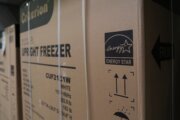DAVID KOENIG
AP Airlines Writer
DALLAS (AP) — The news that a man flew from Liberia to the U.S. after exposure to Ebola, and wound up in a hospital isolation ward, has led to calls for tougher measures to protect Americans, such as a ban on flights from countries hit by the epidemic.
Federal health officials and airlines have dismissed any risk to passengers who flew with the man last month and say they are protecting travelers by screening passengers and wiping down airplane cabins nightly. Five things to know about efforts to contain transmission of the virus on planes:
1. PASSENGER SCREENING
Passengers boarding planes in the outbreak zone have their temperatures taken and answer questions designed to reveal contact with anyone infected with Ebola. Thomas Eric Duncan registered 97.3 degrees. The lack of fever indicated to federal health officials that Duncan wasn’t contagious when he flew from Liberia to Belgium and on to the U.S.
Critics see shortcomings in the system. Ebola’s long dormancy period — up to 21 days — means a passenger could be infected with the Ebola virus and not show symptoms. And the questionnaire relies on the truthfulness of the respondent. Liberian authorities say Duncan failed to disclose that he had helped carry a pregnant woman who later died of Ebola, although it is not clear how much Duncan knew about her condition.
“Screening for Ebola is more difficult than screening for threats to the air system” from terrorists, said Sheldon Jacobson, a computer science professor at the University of Illinois at Urbana-Champaign, who has written extensively about aviation security. He said more needs to be done to vet passengers, perhaps including blood tests for the Ebola virus and some sort of trusted-traveler program for people considered low-risk.
As for more extreme measures, the Centers for Disease Control and Prevention recommends against non-essential travel to Liberia, Sierra Leone and Guinea. The Obama administration said Friday that the U.S. was not considering a ban on travel by Americans to the hardest-hit West African countries. U.S. and international health experts say a ban would hinder the flow of medical personnel and supplies.
But Sen. Mark Kirk, R-Ill., said the Federal Aviation Administration should slowly end U.S. flights to the affected region in order to protect the health of Americans.
2. IN THE AIR
Airlines are required to report deaths of ill passengers who meet certain conditions to the CDC before landing in the U.S.
Morgan Durrant, a spokesman for Delta Air Lines, said flight attendants are trained to spot anyone who looks or reports feeling ill. Crew members can feel the passenger with a gloved hand. They can ask if there is a doctor on board the plane, or consult experts at the CDC or the University of Pittsburgh’s medical center.
The procedures, which have been around for years, are approved by CDC and the UN’s World Health Organization, “They are the experts, and they haven’t issued any guidelines that we need to do anything we are not already doing,” Durrant said.
3. AT THE AIRPORT
The CDC has quarantine stations at 20 major U.S. airports and border crossings. Similar to what occurs during a bomb threat, a plane with a highly contagious person could land and taxi to a remote area away from crowded terminals, and medical crews could be dispatched to the plane. There are procedures for evaluating the traveler, isolating him and taking him to a hospital.
The federal government also has a “Do Not Board” list of people who are contagious and considered likely to fly. The CDC says it has kept more than 250 people with tuberculosis and other illnesses off planes.
4. CLEANING PLANES
Most airlines say they clean their planes at least daily, usually overnight. United Airlines said that its planes receive a “thorough cleaning” every night, including wiping tray tables and armrests with disinfectant and using heavy-duty, all-purpose cleaners on lavatories and galleys.
Duncan flew on two United Airlines planes on Sept. 20 — from Brussels to Dulles International Airport near Washington, then another plane to Dallas-Fort Worth International Airport. Those planes are back flying within the U.S.
5. NO IMPACT ON AIRLINE INDUSTRY
Airlines and their shareholders fear a repeat of the 2003 outbreak of SARS, or severe acute respiratory syndrome, which crippled travel in Asia. Airline and health officials say that while SARS is airborne, Ebola is transmitted only by contact with the blood, sweat or other bodily fluids of an infected person or corpse.
Airline stocks fell Wednesday, when details of Duncan’s travels emerged. They rallied sharply on Friday, as a pickup in hiring boosted stocks overall and the CEOs of American Airlines and British Airways reported seeing no drop in travel bookings from the Ebola scare.
___
Federal Aviation Administration statement on Ebola: http://1.usa.gov/1tnJTYu
Jason Keyser in Chicago contributed to this report.
Contact Koenig at http://www.twitter.com/airlinewriter
Copyright 2014 The Associated Press. All rights reserved. This material may not be published, broadcast, rewritten or redistributed.







